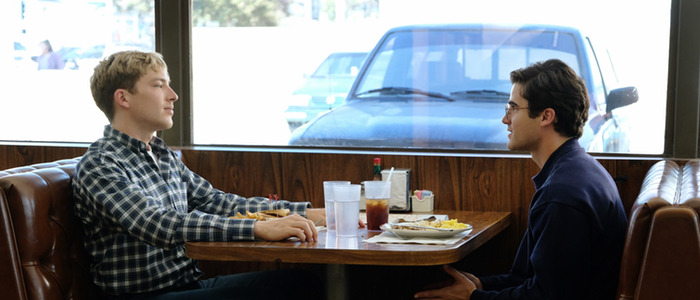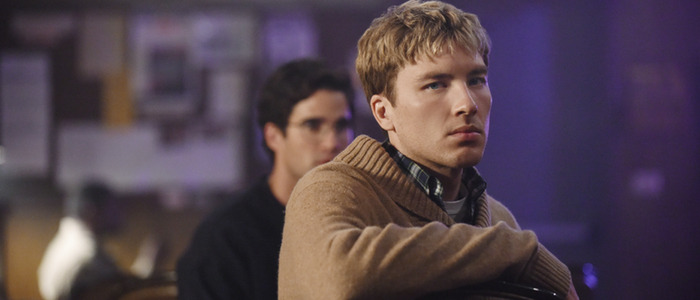'American Crime Story' Review: 'House By The Lake' Tells A Tragic Tale
This week's American Crime Story review takes a look at the latest episode of The Assassination of Gianni Versace, "House By the Lake." Spoilers follow.
The Victims
Welcome to April 27 1997, one week before the murder of Lee Miglin, the victim of last week's episode. With episode four of The Assassination of Gianni Versace, "House By The Lake", we witness the beginning of Andrew Cunanan's killing spree. This is where it all started – this is the moment that would eventually bring Cunanan right up to Gianni Versace's doorstep.Like last week's episode, though, Versace is nowhere to be see in "House By The Lake." Versace's death was merely the rocket fuel to launch this season of American Crime Story into orbit. Ever since this season began its grim backwards march, it's been moving further and further away from the overlit world of Miami Beach to show us the deceptive, manipulative reality of Andrew Cunanan."House By The Lake" begins in Minneapolis, with Andrew staying at the spacious loft apartment of friend and former lover David Madson. Clearly, something awkward has occurred between these two men right before this episode begins. The air in the room is thick with tension. "We both said some things we regret," David says, trying to make peace. "I don't regret anything I said," Andrew replies, each word deliberate and meticulous as he utters it.This passive aggressive mood seems almost unbearable, but things get a lot worse, fast. Andrew and David's friend Jeff Trail soon arrives. He's come to retrieve a gun Andrew stole from his apartment (big red flag alert). David has to let Jeff into the building, and as the two make their way back to the apartment – where Andrew waits in the shadows – they converse about Andrew the way someone talks about a volatile child. It's clear they both think they need to handle Andrew with kid gloves. David seems sympathetic; Jeff, not so much."He has no one," David says."He should ask himself why," Jeff shoots back.Before the opening title card has even appeared, Jeff is dead – brutally bludgeoned to death by Andrew with a hammer. From here, the episode settles into a steady, unrelenting feeling of nameless, inescapable dread. Andrew is able to manipulate David into going on the run with him. But it can't last. Andrew wants to live in a fantasy where David will love him for who he is – but that's the problem. Andrew isn't anyone. He's a blank slate; a shapeshifter who can be whatever the situation needs him to be. You get the sense throughout "House By The Lake" that Andrew is really trying to make his new arrangement with David work. But it's impossible. David is Andrew's emotional (and in some cases, physical) prisoner, and when the realization seeps in that David will never accept him, Andrew kills David too. And then it's off to Chicago, and towards last week's murder of Lee Miglin.
No One Else
Unlike previous episodes, "House By The Lake" isn't ultimately about Andrew. It's about David, and the tragedy of his all-too-brief life. In various flashbacks, we see David as a younger man with his gruff, outdoorsman father. While out hunting one day as a small boy, David runs from the sight of a dead animal. He's later ashamed at his perceived weakness, but his father is sympathetic. "I never want you to be sad," his father tells him.Later, we see David coming out to his father in an uncomfortable, not entirely hopeful, but ultimately realistic scene. "Mind if I take a moment?" David's father asks after David confesses he's gay. "I don't want to say the wrong thing."The father follows this up with, "Maybe you wanted to be told I don't have a problem with it; I can't say that, but what I can say is I love you more than I love my own life." It's a heartbreaking moment, made all the more heartbreaking later when, as David lays dying, he has a vision of sharing a cup of coffee with his father.David's sexuality, and his ultimate fear of disgrace – a fear that was brought up last week as well, but about Lee Miglin – is what colors all of David's ultimately terrible decisions following Jeff's murder. A rational, reasonable thing to have done following Andrew's brutal crime would have been to call the police and report Andrew immediately. But Andrew, so adept at manipulation and exploitation, is able to talk David out of this. And when enough time passes, it's too late. As Andrew puts it, if David tries to call the cops, the cops will simply believe he was in on the murder with Andrew. "They hate us, David. They've always hated us," Andrew says. "You're a f**."These fears turn out to be ultimately reasonable. Later, when two detectives arrive at the apartment after Jeff's body is discovered, their first assumption is that the murder is some sort of "gay thing." They arrive rather quickly at the assumption that David was in some way involved with the murder, and they go so far as to bring that assumption to David's frightened parents.The most telling moment of the episode comes when, while on the run, David and Andrew stop at a bar. Andrew is still riding high, seemingly unperturbed that he's committed a murder and is now a fugitive. In this moment, David excuses himself to the bathroom, where he shatters a window and sees a clear path to escape. The camera lingers on this moment, as we wait for David to do the obvious thing: get the hell out of there.Andrew, meanwhile, sits in the bar, listening to the soothing sounds of special guest star Aimee Mann crooning a sad, slowed-down cover of The Cars' "Drive." Here, in this brief moment, Andrew's barriers fall away and he begins to weep. Is he weeping because of the music (it's pretty damn sad), or is he weeping because he knows he's dug himself into a hole he can never climb out of? Up until he murdered Jeff Trail, Andrew's crimes were petty – long cons and little (and sometimes big) lies. There's no going back from murder, however. And in this moment, perhaps Andrew realizes that nothing matters anymore. That if he wants something going forward, he might as well kill to get it.This moment of reflection is broken when David unexpectedly returns to the table, having decided not to escape. Why? The answer comes later, as the two are on the road again. David confesses he's thinking about what the police are going to find out about him, and says he realizes he's been doing this his entire life – thinking about people "finding out" about his sexuality. He wonders how his parents are going to live in their small town "with all that talk.""Was I really afraid...that you were going to kill me, or was I afraid of the disgrace?" he asks Andrew. David is stuck. He's fear of people judging his sexuality has tethered him to Andrew, and it will, tragically, lead to his doom. As Andrew puts it: "The truth is, we have no one else."
It Was All A Lie
By now, the viewer has likely caught on to the bait and switch American Crime Story: The Assassination of Gianni Versace has pulled. This isn't a bad thing; in fact, it's rather ingenious in its construction. The first two episodes lull the viewer into assuming they know exactly what type of season this will be. Episode three, however, hints that things are going to turn out much differently. And now, by episode four, Versace seems to be pulling back the curtain completely. If this were a card game, this episode would be the moment the player who has been brilliantly bluffing you shows you their hand.Perhaps this is why, ultimately, the season is moving backwards rather than forwards. Andrew Cunanan's murder of Versace made headlines, but it wasn't an isolated incident. By moving back in time, we're getting the whole story, bit by bit. We're learning the true, terrible nature of Andrew Cunanan.Director Dan Minahan approaches this episode on two different fronts: one is that ever-mounting tension mentioned earlier. The first half of the episode, set in the nightmare that is David's apartment, is full of pulse-quickening moments of dread, all of it underscored by an unsettling, ever-present droning sound on the soundtrack. The other front of this episode is the tragic side; the sad life and death of David Madson, who ultimately dies by a river in the middle of nowhere. These heartbreaking elements are the more effective, made all the more so by the performances, particularly Cody Fern as David.By the episode's end, David has realized Andrew's true nature. He recounts the romantic evening he and Andrew once spent years ago, sounding wistful before ultimately ending with a harsh, blunt: "It was all a lie." "Is that why you killed Jeff?" he asks Andrew. "You loved him...but he figured you out in the end, didn't he? He finally saw the real you, and you killed him for it." Fern's delivery of these lines, with just the right mixture of anger and misery, is pitch-perfect.As always, Darren Criss' performance as Andrew remains a highlight, but Andrew has grown more and more despicable and detestable as the season has continued, which ultimately makes spending time with him distasteful. It's a very tough balancing act, and Criss pulls it off for the most part. But there's only so much we can take. A shot near the end of Andrew cuddling David's dead body is particularly blood curdling.
Stray Observations:
– As I'm pretty sure I've said multiple times in this review, this is a sad, heartbreaking episode. But there's some (darkly) funny stuff, too. The way Criss delivers Andrew's line, "I'm so glad you decided to come with me!" after he's virtually kidnapped David is bleakly hilarious.– One subtle but unmissable running motif in the episode: Whenever David and Andrew walk somewhere, Andrew puts his arm over David's shoulder possessively, like property.– Finn Wittrock makes a very brief appearance in this episode as Jeff Trail. Next week's episode, "Don't Ask Don't Tell," will give him center stage. It's also the best episode of the entire season.– This week's pop songs: the aforementioned "Drive" by The Cars (as covered by Aimee Mann), and "Pump up the Jam" by Technotronic.– Yes, that really was Aimee Mann in the bar. "We talked about who we could get to play this," producer Brad Simpson told Vanity Fair. "Somebody who was first known in the 1980s, who had a strong voice and you could buy as somebody who would live in this landscape. When we went to Ryan [Murphy] for suggestions of who could it be, he instantly said, without a beat: 'Aimee Mann. Send her the pages, tell her we're gonna figure out the song, but it has to be her.'"



